 | « Back to article | Print this article |
'When I met him last year for his 75th birthday, he seemed frail. There was a sense of urgency.'
'I will miss Stephen. His passing fills me with sadness.'
An Indian student remembers his teacher, Professor Stephen Hawking.
Professor Daksh Lohiya's association with Stephen Hawking -- who passed into the ages on March 14 and will be buried in Westminster Abbey on March 31 alongside other giants of science like Isaac Newton and Charles Darwin -- began with a letter in 1976-1977.
Professor Hawking could barely write by hand then and the signed letter is one of Dr Lohiya's prized possessions.
Professor Lohiya then went on to be Professor Hawking's student at Cambridge from 1978 to 1982. Dr Lohiya remembers him as a ruthless examiner! Professor Hawking grilled him for 11 hours on his PhD thesis! -- with two breaks.
It was a guru-shishya parampara that continued over the years.
Dr Lohiya taught at Delhi University's physics department from 1984 to 2016 and was appointed emeritus professor thereafter. He is a life member of Clare Hall, Cambridge, for advanced study in applied mathematics and theoretical physics. He spends an average of three months at Cambridge every year.
The last time the shishya met his guru was at Professor Hawking's 75th birthday in 2017.
In a moving tribute to his teacher, interspersed with laughter and sadness, Dr Lohiya speaks about the man behind the brilliant mind with Rediff.com's Archana Masih.
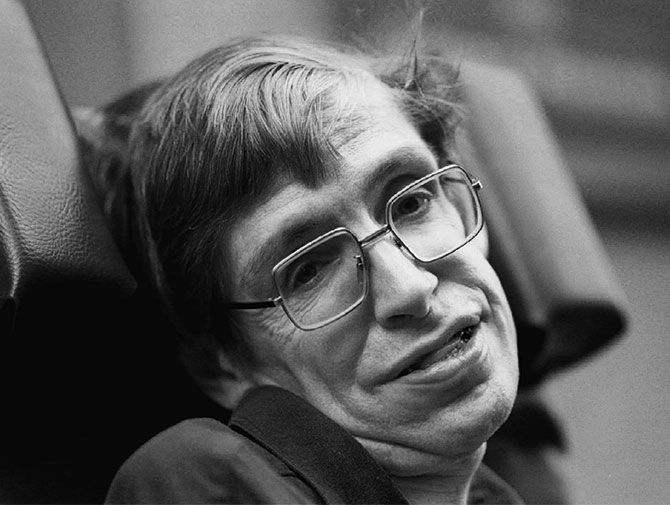
IMAGE: Professor Stephen Hawking attends the launch of Speak to Me, an exhibition which explores the role of new technologies in improving communication for the disabled. Photograph: Dylan Martinez/Reuters
Our department (Department of Applied Mathematic and Theoretical Physics) at Cambridge was full of many wise guys. Every day, at 11 am, we would sit around the coffee table. It was part of our training.
We would discuss any occurrence or some political news and then somebody would raise a point and everyone would start writing on the coffee table. Then the whole conversation would go into Stephen's room and we would start writing on his board.
There we could see how his mind was actually working. We wrote for him because he couldn't.
We could see how he derived a point. His disability gave us training other students could not have -- because we could see what errors he was making, realising he wasn't on the right track and then how he would probe and come to the right direction.
It was great. We could actually read his mind because we were writing it out for him on the board.
Hawking, the teacher
One of my papers had been accepted in a very nice journal. He told me it was a very interesting idea, however...
The moment he said "however", you knew you were killed. He said, "However it has no future." Period. And I knew there was no point in working on that.
In the PhD exam, there is one internal person of the department as an examiner and then there is an external examiner.
Professor Gary Gibbons, who was also my teacher, decided that Stephen Hawking would examine my thesis.
Stephen was so affectionate otherwise, but during the exam he didn't know me at all.
I thought 'Is this the Steven I know?" He went on and on.
He wanted to know how I derived all my conclusions.
My examination lasted 11 hours -- and that is not a record, The record is 25 hours spanned over three days in my department.
Mine started at 9 am and went on till 11 at night with about two breaks.
I then went to Leipzig for three months for a series of lectures. All the time I was thinking about my thesis which had one controversial chapter that they wanted me to withdraw if my thesis was to be considered.
I didn't want to withdraw the chapter because it was the best thing I had done.
I returned to Cambridge in December, the group was having lunch -- Stephen wasn't there -- but when he appeared, he came straight to me and said, "Daksh, we are accepting your thesis."
My thesis went through and I didn't know whether to laugh or cry.
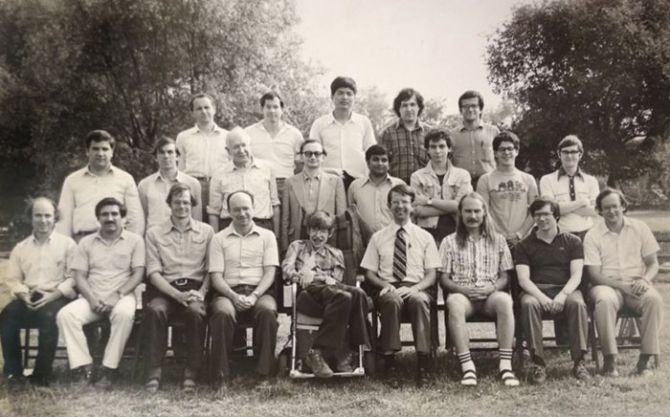
IMAGE: Professor Hawking with his students in Cambridge. Professor Daksh Lohiya is standing, fourth from right, second row.
Next to him, behind Professor Hawking, is the famous Russian physicist Alexei Starobinsky.
Seated, front row, extreme left, is Frank Wilczek, who won the Nobel Prize for Physics in 2004.
"This picture is full of many eminent scientists," says Professor Lohiya.
Photographs: Kind courtesy, Professor Daksh Lohiya.
Walking Hawking home
Any student who was assigned that day would pick him up from his house. It was half a mile from the department.
We would walk him. There were two roads that one had to cross, we would hold the traffic and let him cross.
We would take him to the department, set everything in motion. All his formal things would be taken care of by the secretary.
His home was next to mine, not too far. It was a lovely house. Of course, you had to go with prior appointment.
Initially, I used to have problems understanding him, but then I could lip read. His students could read his lips. You had to get used to him.
If he had to eat and have coffee in the department we would feed him, help him if he had to ease himself and bring him back him home.
As soon as we arrived at his residence there was this feeling of being welcomed by Jane. She would insist that we had tea. It was a very loving atmosphere.
He had the misconception that he had lactose allergy, but it turned to be wrong.
Perhaps he shied away from lactose because of his motions, thinking that students would have to work harder although none of us minded looking after him in any manner.
He would not eat anything with milk products, otherwise he ate a normal diet.
I once made halwa for a lunch time seminar and he had it with relish.
We were all very fond of his first wife, Jane. I have a picture with her at his 75th birthday last year.
Almost ten years ago, I had discussed an idea which is basically a paradigm shift from standard cosmology.
Stephen had suggested that it would not work because of 6 or 7 points. I worked on that and showed it worked better than standard cosmology except for one on which I am still working.
When I met him on his 75th birthday, I told him give me six months I'll finish it and you have to write a foreword.
He suggested whatever you do, you have to hurry.
And now he is no more. I feel sad (voice overwhelmed with emotion).
The signed letter from Professor Hawking
I came to know him in 1976-1977 when we were corresponding on an article I was writing when I was at the University of Delhi.
I had had a terrible train accident which had left me with a paralysed left leg. After we corresponded he sent me a signed letter -- those days he could barely write.
The letter is dated July 12, 1977.
He was very witty. I have a telegram he sent when we got married. I had met my wife -- Senior Advocate Geeta Luthra -- in Cambridge when she was doing law.
The telegram said: 'Congratulations on your marriage. Maybe you can teach your new relatives something about relativity.' -- Professor Hawking, Cambridge Relativity Group.
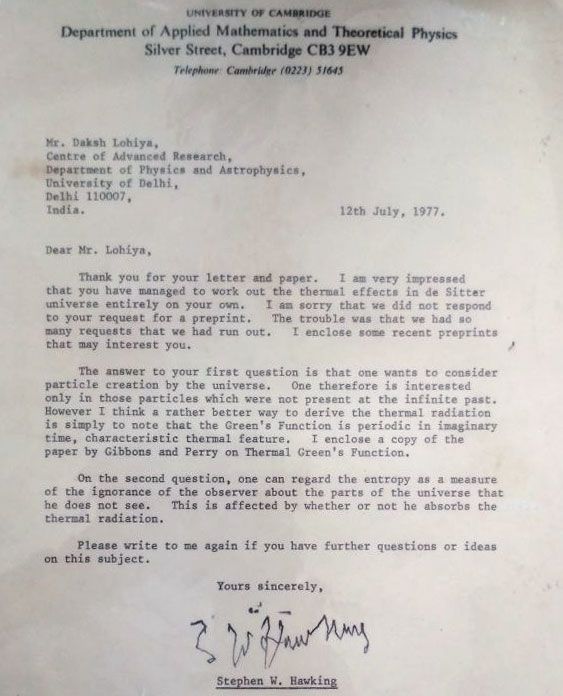
IMAGE: Professor Hawking's letter to Professor Lohiya.
The man behind the brilliant mind
In 1985, he had written a recommendation for me that enabled me to attend a very prestigious conference in Leipzig.
It was a very eventful conference. I decided to return via Cambridge.
Meanwhile, Stephen had become very ill because he had gone to Europe and contracted pneumonia. He had to be flown back.
I called the department when I got to Cambridge. His secretary Judy Fella told me "Thank god, you called, there are no students around and you will have to go to the hospital as Jane is alone and would like some help."
I was extremely tired, I said "Can I go tomorrow?" She said he was very critical.
I went there. He was coming in and out of consciousness. They had done a tracheostomy.
He lost his voice and from then on had been breathing from a hole in his chest.
There was a respirator attached to him which was being adjusted manually.
Jane was happy to see me and asked me to give her a six hour respite.
I was there with him adjusting his oxygen -- when it went in excess he would turn hyperactive and when it became less he would turn blue and faint.
There was one moment he became conscious, saw me, smiled. I could lip read what he said.
"Stephen, how are you" I asked. "Well, I am fine," he said, "what happened in Leipzig?"
He wanted me to report on what happened. I quietly told him the highlights.
Brief History of Time
There is a very nice story about Brief History of Time (the 1988 best-seller that made Professor Hawking an international star). I think Carl Sagan (the astronomer who popularised science writing) put this idea to Stephen that he should write a popular book.
Stephen looked at his students for help because he couldn't do it on his own.
Brian Whitt, a little bit of Bruce Allen (now, the director of the Max Planck Institute for Gravitational Physics in Hanover), a little bit of me -- everybody made some contribution.
Cambridge has an underbelly -- for example, everyone in Cambridge knows that Newton kind of plagiarised calculus.
There was a dispute between him and Gottfried Leibniz and the latter referred it to the Royal Society, not knowing that Newton was president of the society.
Newton accepted the arbitration and appointed his own best friends as referees and held that it was discovered by Newton.
So the European School of Mathematics was very upset with Cambridge.
We wanted to put all these stories in the book and after some reluctance these were all put in.
One day Stephen wheeled into the office which was next to ours, across the coffee room and told Brian Whitt that "My book is out for publishing and I think I might make a profit."
"I think I should share some profit with you," he said. "So would you like a percentage of the proceeds or a downpayment?"
All the other students said "No, no" -- expressing that hum toh guru seva karte hai sentiment. Brian Whitt said, "Well, would 500 pounds be too much to ask?"
500 pounds was a hell of a lot of money because our scholarship was 125 pounds a month.
Judi Fella, the secretary, gave us the cheques. We got them cashed, went to the pub and thought we had gypped the poor man. The book sold 10 million copies at 30 pounds a book!
If one of us had even asked for 1%, we would have been millionaires! (Laughs heartily.)
Lawyers chased Brian Whitt telling him that "Even now if you give us the authority we will get you the money." He said, "No! Nonsense! We won't do that."
After his bestseller people would look out for him. He was a celebrity.
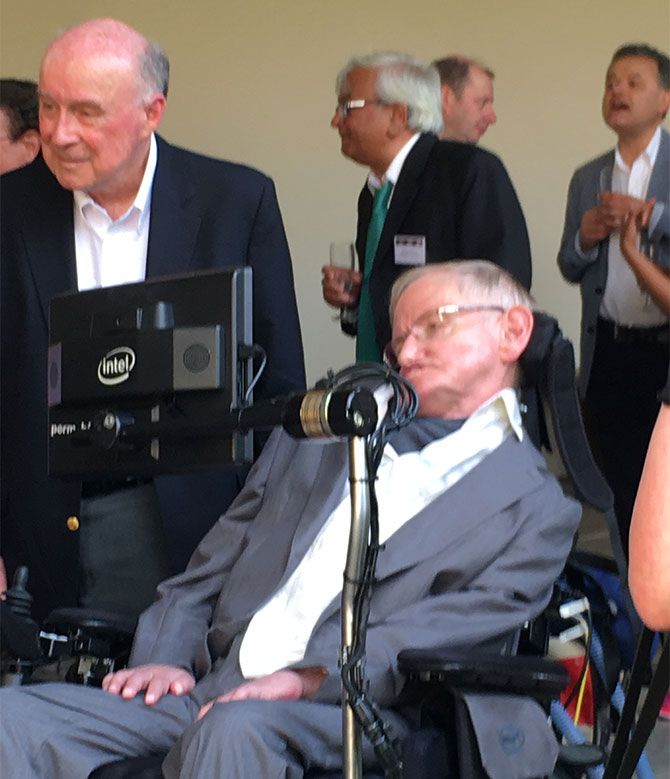
IMAGE: Professor Lohiya (with a glass) with Profesor Hawking on his 75th birthday last year.
Standing behind Professor Hawking is physicist James Bardeen -- his father John Bardeen co-invented the transistor and won the Nobel Prize twice.
Ramps were built overnight for his Delhi visit
I had sent Stephen a paper to which he hadn't responded. I wrote him a note to either reject it or accept it and he responded that he was coming to Bombay to attend a conference on String Theory (in 2001).
I asked if he would book his return ticket from Delhi. I got a message two days later that he would.
I had constructed a new house and I thought I would put him up in the guest room.
I told him I would look after him in Delhi.
I was aware of all his needs and I had thought he was just coming with his wife Elaine.
Four days later, his secretary called to say he was coming with six people.
They needed en suite toilets for everybody and Stephen had to be put up with two attendants. The toilet should be large enough for two people.
I got goose bumps!
Then someone referred me to Vandana Mohan saying that this was not a casual programme, but a big event.
Vandana was an event manager who had done events like the Michael Jackson concert in India, so I went to her.
I asked if Stephen Hawking was big enough. As students in Cambridge, we didn't see his public image as others outside would. I didn't know what kind of interest he would generate.
She said he was big enough and her fee would be 2 lakh, I said where would I get it from! The rough estimate for the event was Rs 8 lakhs.
She said you don't have to raise a single penny and she would do it through sponsorships.
The media was agog, five star hotels were squabbling with each other to host him free of cost.
I had taken a measuring tape to measure the bathroom doors at hotels to see if his wheelchair would go through.
From worrying about funds about where to accommodate him we now had a choice!
I was swarmed by calls for passes for the event.
When Stephen arrived, my wife, daughter and I went to receive him.
He expressed a desire to see Delhi, but the monuments were not disabled-friendly.
We got worried because there were no ramps. We called a very famous activist Javed Abidi who called the prime minister's office. Atal Bihari Vajpayee was the prime minister and Shiela Dixit was Delhi's chief minister.
Ramps were installed overnight.
Stephen was amazed at the Qutub Minar and Jantar Mantar. He met (then) President K R Narayanan and asked him about his vision for science.
He stayed at the Taj and we took him to the Dum Pukht at the Maurya. We had fun.
We had issued passes for his event at Siri Fort and had no arrangements for VIPs.
When the auditorium opened, we saw policeman in the first three rows -- one by one politicians would come and they would get up.
This is how the entire polity of Delhi came.
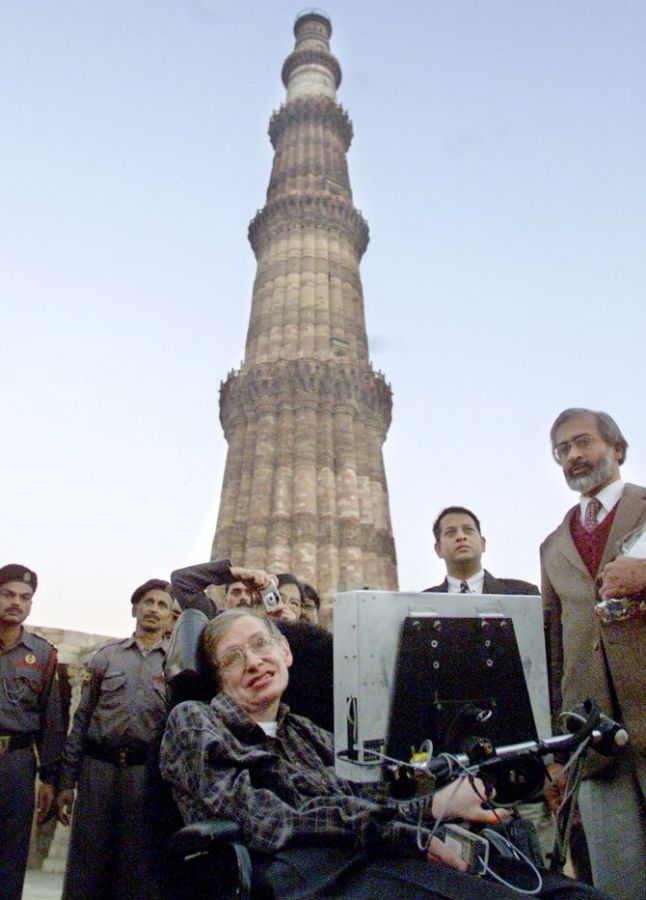
IMAGE: Professor Hawking at the Qutub Minar during his visit to India in 2001. He delivered the Albert Einstein Memorial Lecture 2001, 'Predicting the Future: From Astrology to Black Holes' in Delhi. Ramps were installed overnight for his visit to the Qutub Minar and Jantar Mantar.
Stephen Hawking was Jayant Narlikar's contemporary at Cambridge
He was well-known astrophysicist Jayant Narlikar's contemporary at Cambridge. Stephen's first academic appearance was at a Royal Society meeting in the late '60s.
Fred Hoyle (the Cambridge astronomer known for coining the term 'Big Bang') was a celebrity. Being his student was the classiest thing.
The best students were selected to go to Fred Hoyle. Narlikar was selected and Hawking wasn't.
At a Royal Society meeting, Hawking raised a point which embarrassed Hoyle and Narlikar on a theory supporting negative energy states.
Hoyle thought Hawking had been planted by Martin Ryle (who won the Nobel Prize for Physics in 1974) and his students who wanted to kill the Steady State theory.
There was a sharp divide and Hawking was part of that debate.
Hawking then built formalisms with the help of Roger Penrose (the mathematical physicist who is now Professor Emeritus at Oxford).
He came out with a new book which is a must read -- The Large Scale Structure of Space-time, with George Ellis.
That book gave him recognition in academia.
Then came his most important result on black holes.
This was a shocking, wonderful, result. It combined three very different fields -- statistical mechanics, gravitation and quantum mechanics. The formula that he wrote generated a huge amount of debate.
His mind was so brilliant that one tended to ignore his disability.
I went for his 60th, 70th and 75th birthday celebrations.
When I met him last year for his 75th birthday, he seemed frail. There was a sense of urgency.
He students kept coming back to see him. He drew them to him.
I will miss Stephen. His passing fills me with sadness.
